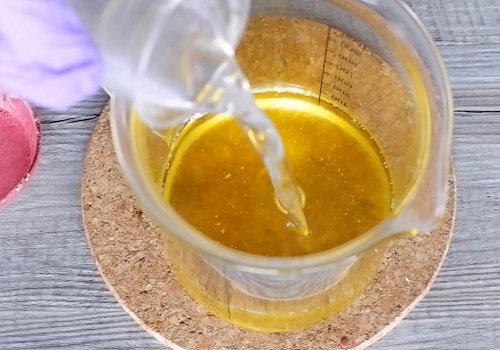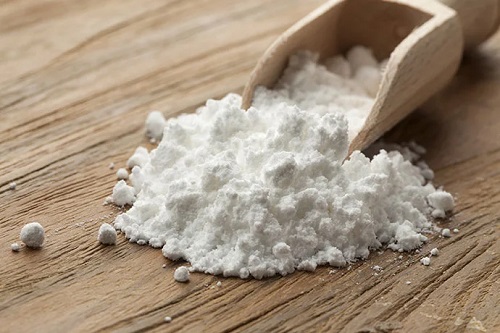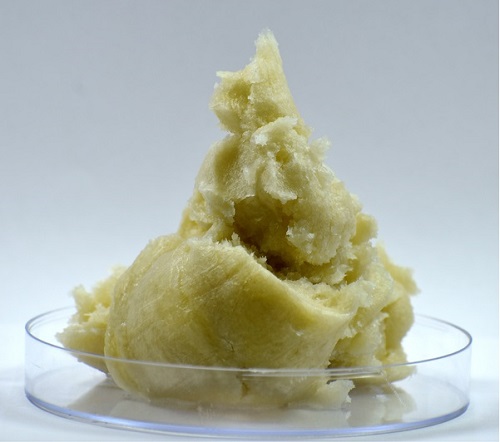Discover the diverse uses of Hydrogenated Castor Oil and learn how it could be a staple ingredient in your household!
Hydrogenated castor oil, often seen listed in the ingredients of various products, may prompt the question—What is hydrogenated castor oil? At first glance, it may seem like just another component on a complex label, but this ingredient plays a pivotal role in numerous applications ranging from skincare to industrial products. Let’s learn about it in detail!
Find out here ‘can castor oil help diverticulitis?’
What Is Hydrogenated Castor Oil?
Hydrogenated castor oil, often referred to as “Castor Wax,” is a unique substance derived from castor oil. It undergoes a transformation process where hydrogen is added to castor oil molecules, resulting in a solid or semi-solid waxy form.
This versatile hydrogenated castor oil finds a wide range of applications, particularly in the skincare and cosmetics industry. It serves as a valuable ingredient that cosmetic companies utilize to enhance the quality of their products, particularly in thickening or stabilizing creams and lotions, further enhancing their shelf-life.
‘Can we apply castor oil on private parts?’ Get an answer here.
Is Hydrogenated Castor Oil Comedogenic?
Hydrogenated Castor Oil is a common ingredient in skincare and cosmetic products, which makes it a matter of concern when it comes to its comedogenic rating. Fortunately, it is non-comedogenic with a rating of 1 on the comedogenicity scale, making it a safe choice for those with acne-prone or sensitive skin.
This ingredient is derived from castor oil through a hydrogenation process, which removes impurities that could lead to pore blockages. Moreover, hydrogenated castor oil is known for its emollient properties, helping to moisturize and soften the skin without causing breakouts.
So, if you’re concerned about potential comedogenic effects, you can be assured that products containing hydrogenated castor oil are unlikely to aggravate acne or blemishes, making it a suitable choice for various skincare formulations.
Uses of Hydrogenated Castor Oil
1. Great Skin Care Agent
Hydrogenated castor oil is like a secret weapon in the skincare world. Whether you are battling dry skin, sunburn or rashes, hydrogenated castor oil can help ease the symptoms. Plus, its low comedogenic rating bars off any risk of clogged pores or acne.
Plus, it’s packed with antioxidants that help you fight against time, keeping your skin looking youthful. Also, if you’ve ever dreaded removing your makeup, this ingredient makes it a breeze and doesn’t strip your skin of its natural goodness.
2. Using Hydrogenated Castor Oil For Hair Care
In hair care, hydrogenated castor oil helps in retaining moisture, addressing common issues like dryness and brittleness. It strengthens hair strands, reducing breakage and promoting overall hair health.
The oil’s natural antimicrobial properties support a healthy scalp environment, preventing dandruff and similar conditions. Additionally, it also encourages hair growth by nourishing the follicles and improving blood circulation, besides adds a natural shine to the hair, enhancing its appearance.
3. Hydrogenated Castor Oil as an Emulsifier in Industries
As an emulsifier, hydrogenated castor oil is effective in blending oil and water-based ingredients, enhancing the stability, texture, and consistency of products.
It is particularly useful in cosmetics and pharmaceuticals, where it helps to prolong shelf life and prevent phase separation. Plus, its hypoallergenic nature makes it suitable for products designed for sensitive skin.
Have a look at the Benefits of Castor Oil for Toothache here
Castor Oil vs Hydrogenated Castor Oil

Castor oil and hydrogenated castor oil, while derived from the same source, have distinct differences in their properties and applications:
- Processing: Castor oil is a natural vegetable oil obtained from the seeds of the castor plant, while hydrogenated castor oil is created by adding hydrogen to castor oil in a process called hydrogenation. This process alters the chemical structure of the oil.
- Physical State: Regular castor oil is typically a liquid at room temperature. Hydrogenated castor oil, on the other hand, often becomes a waxy solid due to the hydrogenation process.
- Comedogenic Rating: Castor oil has a higher comedogenic rating, meaning it is more likely to clog pores in oily or acne prone skin types compared to hydrogenated castor oil, which usually has a lower comedogenic score and is less likely to clog pores.
- Applications in Products: Castor oil is widely used in pharmaceuticals, cosmetics, and as a laxative due to its natural properties. Hydrogenated castor oil is often found in cosmetics, personal care products, and as an emulsifying agent due to its solid state and stability.
- Moisturizing Properties: Both oils are excellent moisturizers, but castor oil has a thicker consistency, making it more suitable for intensive moisturizing treatments. Hydrogenated castor oil, being less dense, is often preferred in lighter, non-greasy formulations.
- Stability and Shelf Life: Hydrogenated castor oil tends to have a longer shelf life and greater stability in various formulations due to its altered chemical structure, compared to regular castor oil.
Can Castor Oil Treat Varicose Veins? explore here
Conclusion
Hydrogenated castor oil is a derivative of natural castor oil, transformed through a hydrogenation process that alters its chemical structure. This process not only changes its physical state, typically turning it into a waxy solid at room temperature, but also increases its stability and shelf life.
With a lower comedogenic rating compared to its original form, it’s less likely to clog pores, making it a more suitable choice for skincare and cosmetic formulations. Its versatility extends to various industries, including pharmaceuticals, personal care, and as an emulsifying agent in product manufacturing.
Get the Best Castor Oil Buyer’s Guide here
FAQs
1: How Can I Tell If I Have An Allergy To Hydrogenated Castor Oil?
Allergic reactions to hydrogenated castor oil may manifest as skin redness, itching, hives, or contact dermatitis. In severe cases, respiratory distress and anaphylaxis can occur. If you suspect an allergy, consult a healthcare professional for proper diagnosis and guidance.
2: Are There Any Side Effects Associated With Hydrogenated Castor Oil?
Hydrogenated castor oil is considered safe for topical use and is well-tolerated by most individuals. However, if you experience any signs of irritation, redness, itching, or discomfort after using a product containing hydrogenated castor oil, discontinue use immediately.
3: Is Hydrogenated Castor Oil Safe For Sensitive Skin?
Yes, hydrogenated castor oil is generally safe for sensitive skin. It is known for its non-comedogenic properties, meaning it is unlikely to clog pores or trigger acne breakouts. However, it is good to conduct a patch test before using products containing hydrogenated castor oil extensively.




